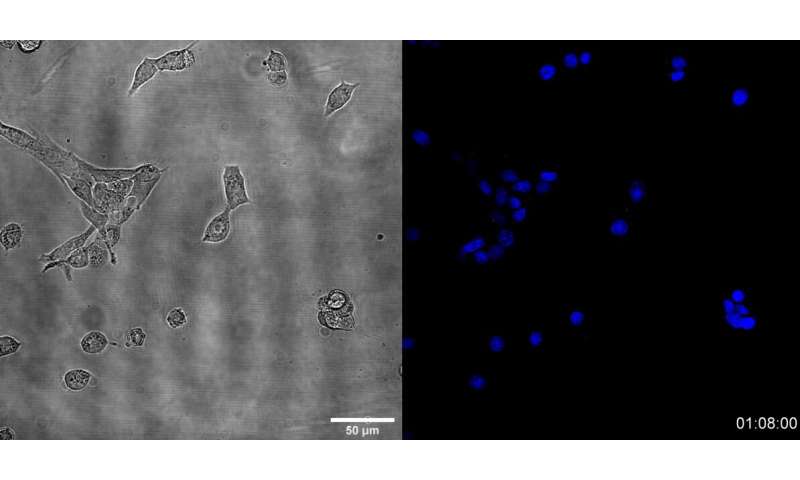
The interdisciplinary team of scientists from three different countries (Belgium, Italy, and Russia) under the leadership of Prof. Dr. Dmitri V. Krysko (Ghent University, Belgium) unravels the immunogenicity of ferroptotic cancer cells.
Cell death is an essential biological process that plays an active role both during human embryonic development and in the onset of various diseases. Every day, about 100 billion cells die in the human body, which is equivalent to 75 kg of body mass per year and can be compared with the average weight of a human. However, the development of many diseases is associated with an imbalance between cells’ death and their survival. Cancer is one of them. It is important to note that the development of cancer cells’ resistance to cell death is directly related to the ineffectiveness of anticancer therapy. Initially, it has been thought that chemo- and radiotherapies induce apoptotic cell death. However, during anticancer therapy, tumor cells acquire mutations that make cancer cells resistant to apoptosis, a type of cell death most often triggered by modern chemo and radiotherapy. This leads to a decrease in the effectiveness of treatment and the progression of cancer. In this case, it is essential to use new treatment methods aimed at inducing alternative types of regulated cell death. Here in the role of ferroptotic cell death (i.e., ferroptosis) becomes crucial.
Aim of the study
The concept of immunogenicity of cell death states that dead/dying cancer cells must induce a specific antitumor immunity; thus, they become immunogenic. Cancer cells undergoing immunogenic cell death trigger the patients’ immune system. Therefore, in addition to just a simple killing of the cancer cells, induction of the immunogenic cell death can effectively induce antitumor immunity activation, leading to tumor eradication and generation of long-term immunity.
Ferroptotic cell death was discovered in 2012, which is different from other best-characterized types of regulated cell death, such as apoptosis and necroptosis. Ferroptosis is initiated by the antioxidant defense mechanisms’ failure, resulting in damaging lipid peroxidation and eventual cell death. Ferroptosis is usually accompanied by a large amount of iron accumulation and lipid peroxidation. In other words, ferroptosis is the biological rust of lipid membranes. Thus, the launch of ferroptosis may help overcome cell death resistance and increase antitumor therapy effectiveness. But until very recently, it was not known whether ferroptotic cancer cells are immunogenic or, in other words, whether ferroptotic cancer cells can induce efficient anticancer immune responses.
Main findings
The research at “Cell Death Investigation and Therapy Laboratory (CDIT)” at Ghent University in Belgium led by Prof. Dr. Dmitri V. Krysko addressed this question. The interdisciplinary team of scientists from three different countries (Belgium, Italy, and Russia) under the leadership of Prof. Dr. Dmitri Krysko (Ghent University, Belgium) investigated the immunogenicity of ferroptotic cancer cells and has shown for the first time that ferroptotic cancer cells are immunogenic. Scientists have discovered that cancer cells undergoing ferroptosis release several immune-stimulatory molecules such as ATP and HMGB1, contributing to the immune system’s activation leading to the induction of strong antitumor immunity. Notably, it is known that not every anticancer therapeutic modality is capable of inducing immunogenic cell death.
Prof. Krysko: “The immunogenicity of early ferroptotic cancel cells has been shown in several in vitro models and in tumor mice models in vivo. The stage of cell death is everything, and it dictates immunogenicity in the case of ferroptosis. Only ferroptotic cancer cells that are at the early stages of cell death process are immunogenic.”
Moreover, the team of Prof. Dmitri V. Krysko (Iuliia Efimova, Dr. Elena Catanzaro, Louis Van der Meeren, Prof. Dr. André G. Skirtach, Dr. Olga Krysko) discovered the detrimental role of the adaptive immune system in the immunogenicity of early ferroptotic cancer cells. This is a very new concept that points out that the stage of cell death very strictly regulates cell death’s immunogenicity.
Significance
Thus, the launch of immunogenic ferroptosis may help overcome cell death resistance and increase antitumor therapy’s effectiveness. This work demonstrated for the first time that cancer cells that die by immunogenic ferroptosis emit immune-stimulatory signals through which they interact with the cells of the immune system, which results in the stimulation of an antitumor immune response. This indicates the immunogenic nature of ferroptotic cell death and leads to the immune system’s involvement in the fight against the tumor.
Summary
Prof. Dmitri V. Krysko: “This is fundamental research. So, we are still a long way from clinical practice. But our results already suggest that immunogenic ferroptosis can help overcome resistance to cell death and increase the effectiveness of cancer therapy.”
Source: Read Full Article
